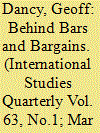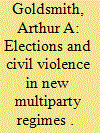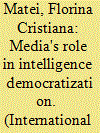|
|
|
Sort Order |
|
|
|
Items / Page
|
|
|
|
|
|
|
| Srl | Item |
| 1 |
ID:
165437


|
|
|
|
|
| Summary/Abstract |
The global transitional justice tool kit—involving the use of criminal prosecutions, amnesties, and other mechanisms to address past human rights abuse—has become a primary means for thwarting future human rights violations and consolidating democracy. Nevertheless, evidence on the consequences of transitional justice remains mixed and amenable to contradictory interpretations. Existing studies fail to adequately address issues of selection, the difference between short- and long-term effects of transitional justice mechanisms, and qualitative and quantitative differences in state practices. This article uses a new database of transitional justice mechanisms to address these concerns and test propositions from realist, constructivist, and holistic approaches to this set of policy issues. We find, among other things, that prosecutions increase physical integrity protections, while amnesties increase the protection of civil and political rights. Our analysis suggests that different transnational justice policies each play a potentially positive, but distinct, role in new democracies and in decreasing violations of human rights.
|
|
|
|
|
|
|
|
|
|
|
|
|
|
|
|
| 2 |
ID:
141229


|
|
|
|
|
| Summary/Abstract |
The introduction of multiparty competition around the world following the Cold War raises the specter of rising civil violence during election periods in emerging democracies and hybrid regimes. Yet there are also plausible theoretical reasons to expect dropping civil violence around elections in these states or, alternatively, no significant change in the level of such conflict. This article tests these hypotheses in Africa with the aid of event data on the daily rate of civil violence incidents (1997–2013). It asks if civil violence in that region is more frequent, less frequent or constant during election cycles compared to other times. To guard against definitional and data selection problems encountered in some prior cross-national studies of elections and use of force, the research design emphasizes the relative risk of social conflict at the national level. The analysis suggests three distinct patterns in Africa. Given countrywide norms, election periods in most countries run the same relative risk of a day with violent events as do non-election periods. A subset of African countries exists, however, with more civil violence during elections when judged against the national reference line for conflict. There is a smaller group of countries where the risk of electoral civil violence is comparatively low. While caution should be exercised in interpreting the findings, the policy implication is that no general reason exists to preclude or defer elections in Africa as a way to minimize social conflict associated with political campaigns, although there may be specific reasons to do so in particular countries.
|
|
|
|
|
|
|
|
|
|
|
|
|
|
|
|
| 3 |
ID:
130229


|
|
|
|
|
| Publication |
2014.
|
| Summary/Abstract |
In their path toward democratic consolidation, emerging democracies endeavor to ensure the democratic transfer of political power, bring changes in the legal framework, transform their executive, legislative, and judicial systems, boost free market economy, and develop robust and functional civil societies. They also institutionalize democratic civil-military relations (CMR) by establishing new security institutions-military, police, and intelligence agencies-that are under democratic civilian control, effective, and efficient. Of these many tasks, the democratization of intelligence agencies is by far the most daunting, as effectiveness and efficiency involve secrecy, while democratic control implies transparency, openness, and accountability. Nevertheless, democratic reform of intelligence in new democracies, though difficult, is not impossible, if and when civilians are interested and willing to "invest" in intelligence and intelligence reform. The contribution of external factors, such as media, 2 civil society, international groups, and individuals involved in human rights, may also be instrumental in achieving a balance between control and effectiveness of intelligence
|
|
|
|
|
|
|
|
|
|
|
|
|
|
|
|
|
|
|
|
|